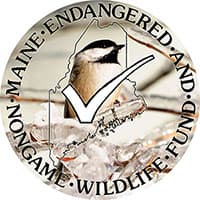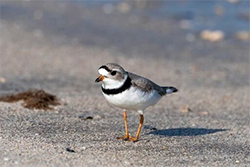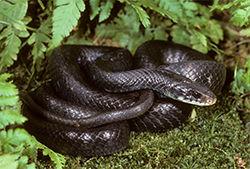Home → Fish & Wildlife → Wildlife → Support Wildlife → Chickadee Check-off
Chickadee Check-off
Endangered & Non-game Wildlife Fund

When you file your State of Maine income taxes, consider donating to the "Chickadee Check-off" and think of yourself as part of the ongoing success in our work with non-game, threatened, or endangered species in Maine. To contribute, use Schedule CP – this is a separate form that is included in the 1040S-ME short form booklet and 1040ME long form booklet. Or let your tax accountant know you would like to support the fund.
Volunteer contributions to the Chickadee Checkoff on Maine's income tax form initially provided funding for non-game and endangered and threatened species in Maine. The Department now deposits checkoff contributions into the Maine Endangered and Non-game Wildlife Fund [ENWF] - a dedicated, interest-bearing account. In 1984, taxpayers contributed $115,794 to the Chickadee Checkoff; by 2009, contributions had plummeted 71% to $33,751. Program funding continues to be a challenge, and every donation helps make a difference for Maine’s wildlife.
Learn about some of MDIFW’s ongoing projects with Maine’s nongame, endangered, and threatened species:
- Maine's bald eagle population has grown from 29 pairs in 1972 to more than 631 pairs today, and in 2009 was delisted from Maine's list of Endangered and Threatened Species.
- Intensive management of piping plovers over the years has yielded record numbers of piping plovers on Maine’s southern beaches: 98 nesting pairs fledged 197 fledgling plovers in 2020. These statistics greatly surpass even the all-time records set in 2019! More than 60% of this year’s plover nests were at locations where MDIFW has established beach management agreements for plover stewardship.
- Record numbers of peregrine falcons, 39 pairs, nested in Maine during 2019. Peregrines that nest further north in Canada and Greenland always pass through Maine during fall migration, but the state’s breeding population disappeared from 1962 to 1986. During the period of 1984 to 1996, MDIFW reintroduced a total of 154 young falcons from captive breeding programs operated by The Peregrine Fund. Acadia National Park, Baxter State Park, Maine Bureau of Parks and Lands, and White Mountain National Forest were key partners in restoring the peregrine to Maine after its 24-year absence. Peregrines now nest in Maine’s urban areas as well as remote cliffs.
- Bat research is underway in Maine on several fronts. Key partnerships with Acadia National Park, University of Maine, and Biodiversity Research Institute are focused on three cave bats listed under Maine ESA in 2015: northern long-eared bat, little brown bat, and eastern smallfooted bat. MDIFW surveys have recently focused on the tri-colored bat, which will also be under consideration for both state and federal listing. In 2019, the Department established long-term acoustic monitoring stations across the state to monitor population trends.
- Substantial efforts continue in Maine and elsewhere in the Northeast to enhance habitats and bolster populations of New England cottontails. Suitable habitat for this species is patchily distributed in southern Maine but fragmented and limited overall, and population numbers have steadily declined.
- Northern black racers were listed as Endangered in Maine in 1987. These agile snakes favor open woods or shrubby areas with sandy soils. MDIFW staff have implanted radio transmitters to better improve our understanding of these snakes’ movements and their overall habitat requirements. In the Kennebunk Plains Wildlife Management Area, we have initiated habitat restoration to help improve black racer habitat conditions.
- Two mayflies that occur only in the Northeast are listed as Threatened in Maine: Roaring Brook mayfly and Tomah mayfly. As is often the case, the conservation focus that followed listing of these species has led to more survey efforts, additional discoveries, and improved habitat protections by partners helping to implement MDIFW’s recommended best management practices.


Thank you for your support in conserving Maine’s wildlife. Learn more about MDIFW’s work with nongame, endangered, and threatened species in the annual Research and Management Report.